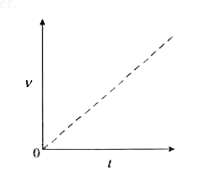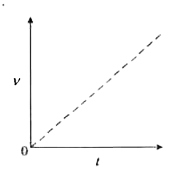A rock, dropped from rest near the surface of an atmosphere-free planet, attains a speed of 20.0 m/s after falling 8.0 m.
How long did it take the object to fall the 8.0 m mentioned ?
0.40 s
1.3 s
0.80 s
2.5 s
The correct Answer is:C
To solve the problem, we will use the equations of motion. Here’s a step-by-step breakdown:
Step 1: Identify the known values
- Initial velocity (u) = 0 m/s (since the rock is dropped from rest)
- Final velocity (v) = 20.0 m/s
- Distance fallen (s) = 8.0 m
Step 2: Use the equation of motion to find acceleration (a)
We can use the equation:
v2=u2+2as
Substituting the known values:
(20.0)2=(0)2+2a(8.0)
400=0+16a
16a=400
a=40016=25.0m/s2
Step 3: Use the acceleration to find the time (t)
Now we will use another equation of motion:
v=u+at
Substituting the known values:
20.0=0+(25.0)t
20.0=25.0t
t=20.025.0=0.8s
Final Answer
The time taken for the rock to fall 8.0 m is 0.8 seconds.
---
- Initial velocity (u) = 0 m/s (since the rock is dropped from rest)
- Final velocity (v) = 20.0 m/s
- Distance fallen (s) = 8.0 m
We can use the equation:
v2=u2+2as
(20.0)2=(0)2+2a(8.0)
400=0+16a
16a=400
a=40016=25.0m/s2
Now we will use another equation of motion:
v=u+at
20.0=0+(25.0)t
20.0=25.0t
t=20.025.0=0.8s
The time taken for the rock to fall 8.0 m is 0.8 seconds.
Topper's Solved these Questions
- MOTION ALONG A STRAIGHT LINEBOOK - RESNICK AND HALLIDAYCHAPTER - MOTION ALONG A STRAIGHT LINEEXERCISE - PRACTICE QUESTIONS ( Matrix-Match)
3 Videos
- MOTION ALONG A STRAIGHT LINEBOOK - RESNICK AND HALLIDAYCHAPTER - MOTION ALONG A STRAIGHT LINEEXERCISE - PRACTICE QUESTIONS ( Integer Type )
3 Videos
- MOTION ALONG A STRAIGHT LINEBOOK - RESNICK AND HALLIDAYCHAPTER - MOTION ALONG A STRAIGHT LINEEXERCISE - PRACTICE QUESTIONS ( More than One Correct Choice Type )
6 Videos
- MAGNETIC FORCEBOOK - RESNICK AND HALLIDAYCHAPTER - MAGNETIC FORCEEXERCISE - Practice Questions (Integer type )
7 Videos
- MOTION IN TWO AND THREE DIMENSIONSBOOK - RESNICK AND HALLIDAYCHAPTER - MOTION IN TWO AND THREE DIMENSIONSEXERCISE - PRACTICE QUESTIONS (MATRIX-MATCH)
10 Videos
Similar Questions
Knowledge Check
A rock, dropped from rest near the surface of an atmosphere-free planet, attains a speed of 20.0 m/s after falling 8.0 m.
How long would it take the object, falling from rest, to fall 16 m on this planet ?A0.8 sB2.5 sC1.1 sD3.5 sA rock, dropped from rest near the surface of an atmosphere-free planet, attains a speed of 20.0 m/s after falling 8.0 m.
Determine the speed of the object after falling from rest through 16 m on this planet .A28 m/sB32 m/sC56 m/sD64 m/sA rock, dropped from rest near the surface of an atmosphere-free planet, attains a speed of 20.0 m/s after falling 8.0 m.
What is the magnitude of the acceleration due to gravity on the surface of this planet ?A0.40m/s2B2.5m/s2C1.3m/s2D25m/s2
A 400 kg car attains a speed of 50 m/s from rest in 20s. The power developed in the engine will be
View SolutionA 400kg car attains a speed of 50m/s from rest in 20s. The power developed in the engine will be
View SolutionIf the uniform acceleration near the surface of the earth is about 9.8 m/sec2. for a free-fall, what Is the velocity at the end of 2 seconds of fall (neglect friction) ?
View SolutionThe figure shows the speed as a function of time for an object in free fall near the surface of the earth. The object was dropped from rest in a long evacuated cylinder .

What is the speed of the object 3.0 seconds after it is dropped ?
View SolutionThe figure shows the speed as a function of time for an object in free fall near the surface of the earth. The object was dropped from rest in a long evacuated cylinder .

What is the numerical value of the slope of the line ?
View Solution
